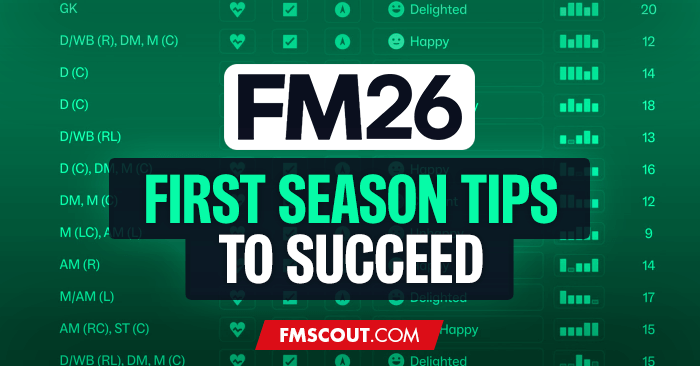
Whether you're managing a title contender or a mid-table club, the decisions you make in the opening months can decide if you succeed or struggle.
This guide covers everything you need to know to get through your first season successfully.
Pre-Season: Building the Foundation
Check Your Squad First
Before doing anything else, understand what you have. Open your Squad screen and look at: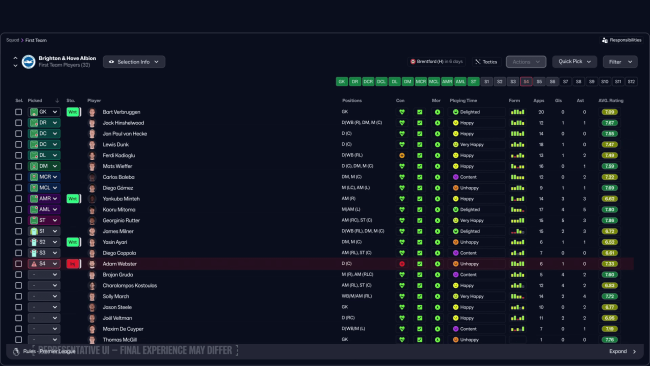
Position Coverage:
Find areas where you don't have backup players. If you only have one striker, that's a priority signing.
Player Quality:
Use your coaches' reports and scout assessments. Don't only look at reputation—a highly-rated player might not fit your system.
Contracts:
Check which players are in their final year. You might need to sell them now or lose them for free.
Unhappy Players:
Some players may be unhappy or want to leave. Decide if you should keep them happy or sell them.
Age Profile:
A squad full of 30+ year old players needs new blood. Too many teenagers means inconsistent results.
Set Your Basic Tactics
Don't make tactics too complex in pre-season. Create a simple, effective system that suits your squad's strengths.
Choose Your Formation:
Pick a formation that matches your available players. If you have two great strikers, use a 4-4-2. Strong wide players? Try a 4-3-3.
Set Mentality and Instructions:
Start balanced. You can change based on the opponent later. Avoid extreme mentalities (Very Attacking or Very Defensive) until you know how your team performs.
Test Dual Formations:
FM26's new system allows separate In Possession and Out of Possession formations. Start with similar shapes and make small changes based on how matches go.
Assign Player Roles:
Match roles to your players' attributes. Don't force a slow defender to play as a Ball Playing Defender if his technique is poor.
Pre-Season Friendlies
Use friendlies to:- Build match fitness: Essential for the season ahead
- Test tactics: Try different approaches
- Check fringe players: Give squad players game time to see how good they are
- Integrate new signings: Let them play with the team
Transfer Window Strategy

Fix Needs Before Wants:
You need a backup striker more than an exciting winger if you don't have depth up front.
Set a Budget:
Don't spend all your money on one player. Spread money across multiple signings.
Consider Loans:
Loan deals let you add strength without long-term commitment. Perfect for filling gaps or testing before you buy.
Sell Players You Don't Need:
Get rid of players who don't fit your plans. Their wages can pay for better signings.
Don't Rush:
The window stays open for weeks. Scout properly before you sign players.
Listen to Staff:
Your scouts and assistant manager will suggest targets. Listen to their advice, especially if you're new to the club.
Opening Weeks: Building Momentum
Start Strong
Your first few matches set the tone. Players, fans, and the board judge you based on early results.Play Your Strongest Team:
Don't rotate in the opening weeks. Build confidence with your best team.
Win at Home:
Focus on wins at home. Home games are easier to win, and early home wins build momentum.
Study the Opposition:
Use the opposition reports from your assistant manager. Change tactics based on this.
Be Careful Away:
Away games are harder, especially against stronger teams. Playing for a draw isn't weak—it's smart management.
Communication Matters

Press Conferences:
Don't underestimate these. Your answers affect player morale, board confidence, and media perception.
- Be confident but not arrogant
- Praise your players when appropriate
- Don't criticize players publicly unless necessary
- Respect opponents (especially before big matches)
Consistent messaging works better than constantly changing your tone. Be positive when winning, demanding when underperforming.
Individual Conversations:
Check in with key players regularly. Praising good form or discussing their development builds relationships.
Set Up Training
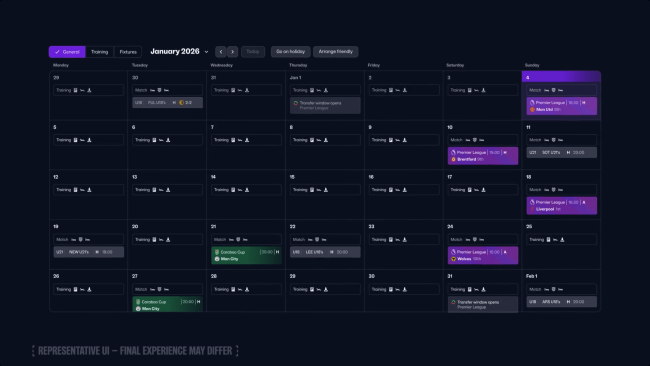
Work with your coaches to create training schedules that:
- Balance match preparation with skill development
- Keep players fit without overtraining
- Focus on team weaknesses (if your defense struggles, work on defending drills)
- Give young players individual attention to help them develop faster
Mid-Season: Managing the Grind
Squad Rotation
Injuries and fatigue build up as the season goes on. Smart rotation keeps your team fresh.Use Cup Games:
Domestic cups are perfect for giving fringe players game time. If you're in a mid-table position, focus on league form over cup runs.
Monitor Condition:
Players with condition below 85% risk injury or poor performance. Rest them when possible.
Avoid Burn-Out:
Playing the same team every match leads to fatigue and injuries. Rotate even when results are good.
Christmas Period:
Many games in late December test squad depth. Plan ahead and rotate heavily.

January Transfer Window
The winter window is harder than summer. Players are harder to sign, and prices are higher.Check Your Position:
Are you challenging for promotion/titles, fighting relegation, or safely mid-table? Your priorities are different for each.
Loan Market:
January is perfect for emergency loans. If injuries have hurt your defense, a six-month loan can save your season.
Don't Panic Buy:
Don't overspend on average players just because you're struggling. Bad signings hurt you for years.
Consider Selling:
If a fringe player gets offers, sell. The money can strengthen other areas.
Focus on Now:
You need players who can perform now, not projects for the future.
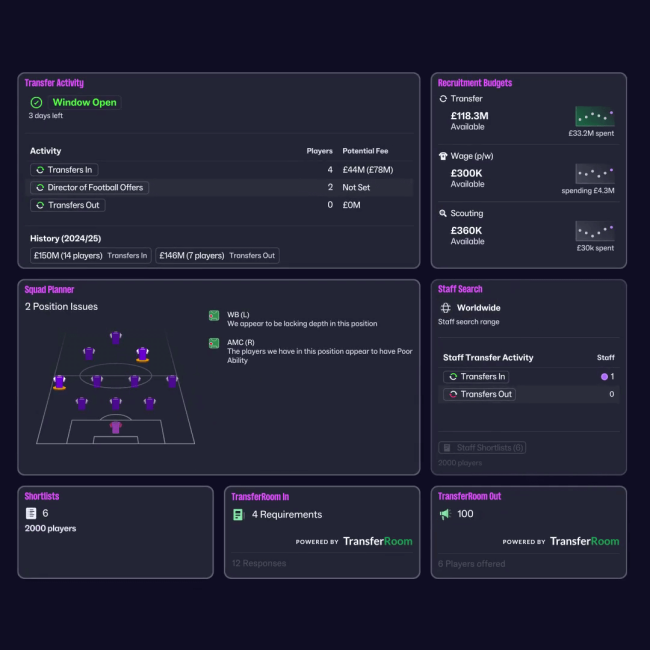
Handling Pressure
Losing Streaks:Every manager faces them. Don't panic and change all your tactics after two losses. Make small changes, not big ones.
Board Pressure:
If the board is unhappy, check your targets. Are you meeting expectations? Focus on achievable goals.
Media Criticism:
Ignore negative press unless it's affecting player morale. Media opinion doesn't directly affect results.
Fan Problems:
Fans react to results. Win matches, and they'll calm down. Don't make quick decisions to make them happy.
Run-In: Finishing Strong
Focus on Your Goals
As the season enters its final weeks, be clear about priorities.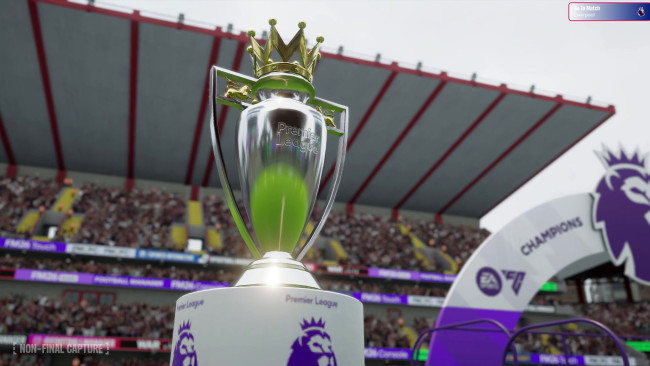
Fighting for Titles/Promotion:
Play your strongest team every match. Focus on league over cups. Manage fatigue carefully.
Avoiding Relegation:
Every point matters. Be practical, draws away from home are good results. Set up defensively against stronger opponents.
Mid-Table Comfort:
If you've achieved your goals, this is the time to experiment. Give young players minutes. Try new tactics. Prepare for next season.
Managing Player Fatigue
Squad Depth:Use every available player. Tired legs in March/April cost you points in the run-in.
Training Intensity:
Reduce training intensity in the final weeks. Recovery matters more than improvement now.
Rotation Strategy:
Rotate before big matches, not after. Resting key players against weaker opponents keeps them fresh for crucial games.
End-of-Season Tasks
Contract Renewals:Tie down key players whose contracts are ending. Don't let valuable players leave for free.
Squad Planning:
Identify positions to strengthen. Make notes on which players to keep, sell, or release.
Review Performance:
Analyze the season. What worked? What didn't? Use this knowledge for next season's planning.
Common First Season Problems
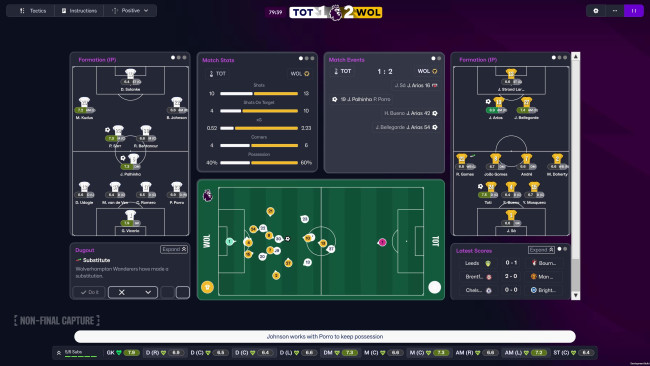
Changing Tactics Too Much
Constantly changing tactics confuses players. If your system isn't working, make small changes rather than starting from scratch.Buying Too Many Players
Signing 8-10 players in one window hurts team harmony. Be selective. Quality over quantity.Ignoring Team Chemistry
Team chemistry matters. Signing talented players who don't fit the dressing room culture causes problems.Not Using Your Staff
Your assistant manager, coaches, and scouts are there to help. Give them team talks, scouting, and training tasks when appropriate.Unrealistic Expectations
If you're managing a relegation candidate, a mid-table finish is success. Don't compare yourself to elite managers with elite squads.Not Playing Youth
Even in your first season, play young players. They develop faster with game time, and they're your future.Key Success Signs
By season's end, you should aim for:Meeting Objectives:
Meeting or beating board expectations is crucial for job security and budget increases.
Squad Harmony:
Good morale and team dynamics show a healthy dressing room.
Clear Playing Style:
Your team should have a clear style that suits your squad.
Financial Stability:
Avoid huge losses. Spending more than you earn causes long-term problems.
Youth Development:
At least one or two young players should have improved noticeably.
Fan Satisfaction:
Happy fans increase matchday money and create a positive atmosphere.
Planning for Year Two
As your first season ends, start planning ahead:Find Transfer Targets:
Scout players early. Competition for signatures is tough.

Check Contract Situations:
Which players need new deals? Who should you sell?
Set Personal Goals:
What do you want to achieve next season? Be realistic but ambitious.
Review Facilities:
If your training ground or youth facilities need upgrades, ask the board.
Think About Staff Changes:
Do you need better coaches or scouts? The close season is the time to improve your staff team.
Final Thoughts
Your first season is a learning experience. Even if results don't meet expectations, the knowledge you gain about your squad, tactics, and the club sets you up for future success.Don't be too hard on yourself. Every great FM save starts with a first season. Some managers win trophies right away. Others spend years building. Both paths are valid.
The most important thing is to enjoy the journey. Football Manager is about stories, not just trophies.
Whether you barely survive or dominate the league, your first season is just the beginning of your managerial career.
Good luck, and enjoy the ride.






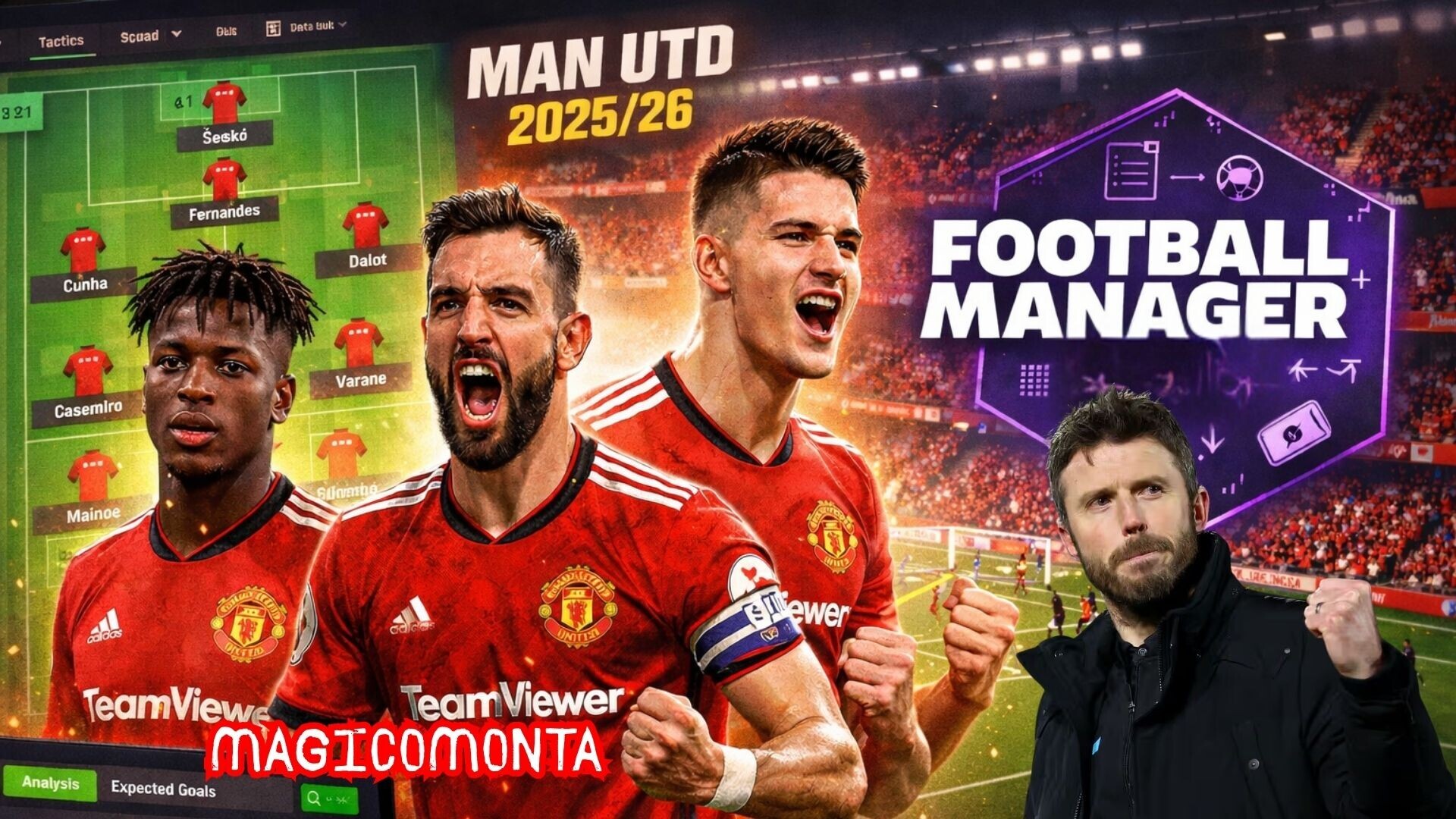



Discussion: FM26 First Season: The Essential Guide to Starting Strong
No comments have been posted yet..